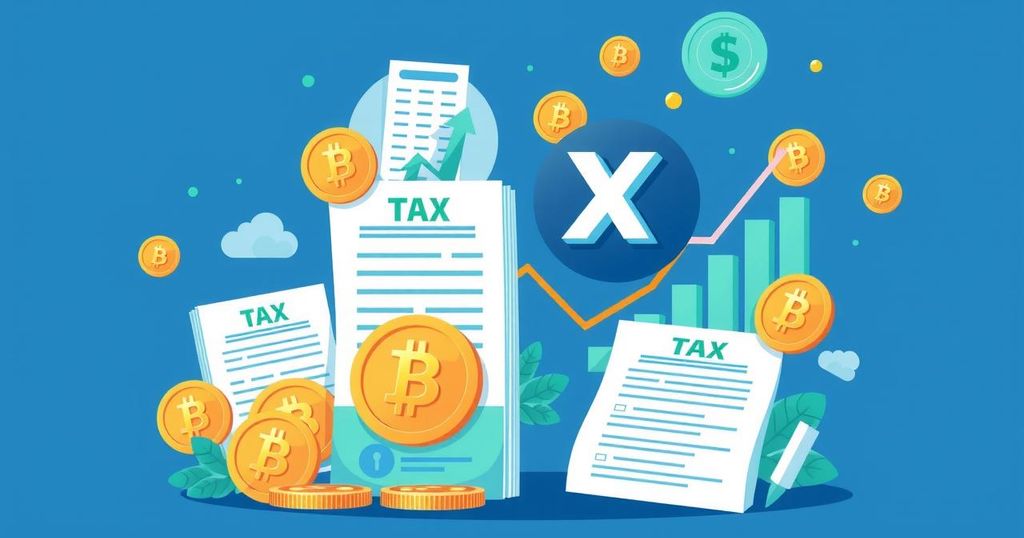Nigeria is a growing center for cryptocurrency engagement, necessitating awareness of tax obligations. The Federal Inland Revenue Service (FIRS) and Securities and Exchange Commission (SEC) govern the taxation of crypto assets. Tax structures include capital gains tax, income tax on earnings, and value-added tax on platform services, with regulations tightening ahead of 2025.
Nigeria has emerged as a prominent hub for cryptocurrency usage, with many citizens actively engaging with Bitcoin, Ethereum, and other digital currencies, particularly due to the complexities of the local economy. Understanding cryptocurrency taxation is crucial in order to avoid complications associated with trading. The Federal Inland Revenue Service (FIRS) is responsible for overseeing cryptocurrency taxes, with regulations expected to become stricter by 2025.
In Nigeria, two key entities regulate the cryptocurrency landscape: the Federal Inland Revenue Service (FIRS) and the Securities and Exchange Commission (SEC). The Finance Act of 2023 officially incorporated cryptocurrencies into the tax framework, while new SEC regulations set for 2025 will further enhance oversight of exchanges. In Nigeria, cryptocurrencies are classified as “property” or “digital assets,” triggering taxation when profits are realized from transaction activities.
Cryptocurrency-related taxes in Nigeria are categorized by usage. Capital Gains Tax (CGT) is applied when an individual sells cryptocurrency for profit, such as converting Bitcoin to naira. Income Tax is applicable on earnings derived from mining, staking, and airdrops, while Value-Added Tax (VAT) at a rate of 7.5% has been instituted on charges levied by crypto platforms since 2024. Currently, there exist no wealth or inheritance taxes related to crypto holdings but this could change.
Nigerians are subject to specific tax rates and brackets. The Capital Gains Tax remains fixed at 10% for all profit-generating sales of cryptocurrency. Income tax on cryptocurrency earnings reflects the standard rates in Nigeria: 7% for income up to ₦300,000, escalating to 24% for income over ₦3.2 million, and 30% for corporations. There is a small exemption of ₦10,000 applicable against CGT, and losses can occasionally mitigate tax liabilities.
Different crypto activities attract varying tax implications. Purchasing cryptocurrency using naira is not taxable, whereas selling it for profit incurs a 10% CGT. Income from mining or staking activities is taxed based on its value at the time of receipt. Transactions for services rendered or goods sold in cryptocurrency are treated as regular income. Additionally, swapping one cryptocurrency for another incurs CGT only when profits are realized.
Taxpayers must diligently report their cryptocurrency income to the FIRS via the TaxPro-Max online portal. Individuals adhere to personal income tax regulations, while businesses comply with corporate tax laws. Accurate record-keeping of transactions—including dates, amounts, and naira values—is essential for compliance. Individuals must file by March 31, and companies by June 30, failing which may result in penalties starting at ₦10,000 or 5% of unpaid taxes.
Taxpayers may find avenues to reduce their crypto tax obligations. Losses incurred from trades can offset gains and lower CGT; however, these must be reported within the same tax year. Businesses are entitled to deduct expenses related to mining equipment and fees, alongside a standard ₦10,000 CGT exemption. Maintain proper documentation is vital for successfully claiming any tax reliefs.
With an eye towards enhanced enforcement, the FIRS is set to utilize blockchain technology and data exchange mechanisms in 2025 to combat tax evasion. The implementation of Know Your Customer (KYC) protocols on trading platforms will aid in tracking users; however, monitoring peer-to-peer trading remains challenging. Negligence or inaccuracies in tax reporting could lead to escalating fines, with serious offenders facing potential criminal charges. Recent enforcement actions, such as the 2024 Binance incident, underscore the movement towards stricter compliance.
The future trajectory of crypto taxation in Nigeria appears fluid. Discussions surrounding potential legislation for 2025 include a proposed 0.5–1% CGT on all profits and an expansion of VAT, aimed at bolstering government revenue. Policymakers aspire to strike a balance between fair taxation and maintaining an inviting environment for cryptocurrency users. Prospective incentives, such as tax breaks for startups, may be introduced as Nigeria advances its digital economic goals.
In summary, Nigeria’s taxation framework for cryptocurrencies includes a 10% CGT, income tax on gains, and a 7.5% VAT on platform fees, overseen by the FIRS and SEC. Maintaining precise records and adhering to filing deadlines is essential for avoiding complications. As regulatory measures tighten in 2025, engaging with tax professionals can support individuals in navigating these evolving tax landscapes effectively.
In conclusion, Nigeria’s crypto taxation landscape is rapidly evolving with significant regulations in place, including a 10% capital gains tax, income tax on various earnings, and VAT on platform services. Taxpayers must remain compliant by maintaining accurate records and meeting filing deadlines to avoid penalties. With impending regulations expected in 2025, it is advisable for individuals and businesses to consult tax experts to effectively manage their cryptocurrency transactions and comply with tax obligations.
Original Source: coinfomania.com




